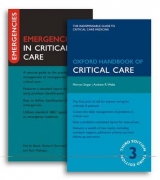
Oxford Handbook of Critical Care and Emergencies in Critical Care Pack
Oxford University Press
978-0-19-955334-1 (ISBN)
- Titel erscheint in neuer Auflage
- Artikel merken
For the first time the Oxford Handbook of Critical Care and Emergencies in Critical Care have been bundled together representing excellent value for the medical student or junior doctor purchaser. The combination of practical advice and essential background information with an easily accessible guide in emergencies presents a unique package essential to every doctor and medical student. Of all the medical specialties, few if any are as exacting and complex as critical care medicine. All members of the multidisciplinary team caring for critically ill patients require a sound knowledge of physiology, pathophysiology, biochemistry, technology and pharmacology. The new edition of this enormously popular Oxford Handbook describes best practice in critical care in a succinct, concise, clinically orientated way. It covers therapeutic and monitoring devices, drugs and fluids, specific organ system disorders and complications, and general management philosophies. Ample space is provided to append or amend sections to suit local protocols and particular practices.The 'Oxford Handbook of Critical Care' will serve the consultant, junior doctor, nurse or other paramedical staff as a reference book, aide memoire and handy pocket book providing rationales and solutions to most of the problems encountered.
Emergencies in Critical Care provides a practical, accessible guide to all emergency situations encountered in the critical care setting. Emergencies are very common in the critical care setting; but also surprisingly predictable. This book helps critical care staff identify those at risk, how to manage them, and how to be prepared in the ward. The book is split into two halves: the first about emergencies within specific systems; the second concentrates on various conditions or groups of patients. Most chapters begin with a generic description of how to manage emergencies affecting that system, or patient group. This is followed by details of specific diagnoses and how they should be managed. The author team have also tried, where possible, to follow the 'ABC' approach, which is not only the standard approach to emergency management, but also a widely-used scheme for documenting daily reviews on ICU and for documenting trauma management.
OXFORD HANDBOOK OF CRITICAL CARE; 1. Respiratory therapy techniques; 2. Cardiovascular therapy techniques; 3. Renal therapy techniques; 4. Gastrointestinal therapy techniques; 5. Nutrition; 6. Special support surfaces; 7. Respiratory monitoring; 8. Cardiovascular monitoring; 9. Neurological monitoring; 10. Laboratory monitoring; 11. Miscellaneous monitoring; 12. Fluids; 13. Respiratory drugs; 14. Cardiovascular drugs; 15. Renal drugs; 16. Gastrointestinal drugs; 17. Neurological drugs; 18. Haematological drugs; 19. Miscellaneous drugs; 20. Resuscitation; 21. Respiratory disorders; 22. Cardiovascular disorders; 23. Renal disorders; 24. Gastrointestinal disorders; 25. Hepatic disorders; 26. Neurological disorders; 27. Haematological disorders; 28. Metabolic disorders; 29. Poisoning; 30. Infection and inflammation; 31. Trauma and burns; 32. Physical disorders; 33. Pain and post-operative intensive care; 34. Obstetric emergencies; 35. Death and the dying patient; 36. ICU Organisation and management; EMERGENCIES IN CRITICAL CARE; 1. Assessment / stabilisation; 2. Airway; 3. Breathing; 4. Circulation; 5. Neurology; 6. Metabolic and endocrine; 7. Renal; 8. Gastro-intestinal and hepatic; 9. Haematology; 10. Infections; 11. Surgical patients; 12. Trauma and burns; 13. Obstetric critical care; 14. Poisoning and overdose; 15. Miscellaneous conditions; 16. Transfers, retrievals, and major incidents; 17. Organ donation and coroner referrals; APPENDICES; 1. Common emergency procedures; 2. Reference values; 3. Useful information
| Erscheint lt. Verlag | 12.6.2008 |
|---|---|
| Reihe/Serie | Oxford Handbooks |
| Zusatzinfo | numerous black and white line drawings and photos |
| Verlagsort | Oxford |
| Sprache | englisch |
| Maße | 100 x 180 mm |
| Gewicht | 644 g |
| Themenwelt | Medizin / Pharmazie ► Medizinische Fachgebiete ► Intensivmedizin |
| ISBN-10 | 0-19-955334-3 / 0199553343 |
| ISBN-13 | 978-0-19-955334-1 / 9780199553341 |
| Zustand | Neuware |
| Haben Sie eine Frage zum Produkt? |
